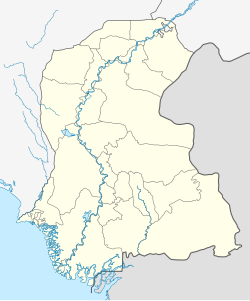This article has multiple issues. Please help improve it or discuss these issues on the talk page. (Learn how and when to remove these messages)
|
Jacobabad
| |
|---|---|
 | |
| Coordinates: 28°16′37″N 68°27′05″E / 28.27694°N 68.45139°E | |
| Country | |
| Province | |
| Division | Larkana Division |
| District | Jacobabad District |
| Founded | 1847 |
| Population | |
• City | 219,315 |
| • Rank | 47th in Pakistan |
| Time zone | UTC+5 (PST) |
Jacobabad (Urdu: جیکب آباد and Sindhi: جيڪب آباد; formerly Khanger or Khangarh) is a city in Sindh, Pakistan, serving as both the capital city of Jacobabad District and the administrative centre of Jacobabad Taluka, an administrative subdivision of the district. The city itself is subdivided into eight Union Councils. Sitting far to the northwest of the province, near the provincial boundaries of Sindh and Balochistan, Jacobabad became a city on the site of an existing village (Khangarh), and is crossed by the Pakistan Railways and many main roads of the province. It is the 43rd most populous city in Pakistan.
The city is one of the hottest places on earth, with summer temperatures regularly rising to a mean temperature of 37 °C (99 °F).[2] In particular, compounded by the humidity and climate change, Jacobabad has several times exceeded a wet-bulb temperature of 35 °C (95 °F), above which the human body cannot sufficiently cool itself.[3] Jacobabad has been cited as one of the world's most vulnerable places to global warming, and one where the difference between 1.5 °C and 2 °C can be the difference between life and death.[4]
- ^ "PAKISTAN: Provinces and Major Cities". PAKISTAN: Provinces and Major Cities. citypopulation.de. Retrieved 4 May 2020.
- ^ Cite error: The named reference
Bombay1857was invoked but never defined (see the help page). - ^ Farmer, Ben (28 June 2021). "Hotter than the human body can handle: Pakistan city broils in world's highest temperatures". The Telegraph. ISSN 0307-1235. Retrieved 15 July 2021.
- ^ Atkin, Emily (31 March 2022). "The Meaning of Half a Degree: A New Way to Think about Climate Change". GQ. Retrieved 31 March 2022.

